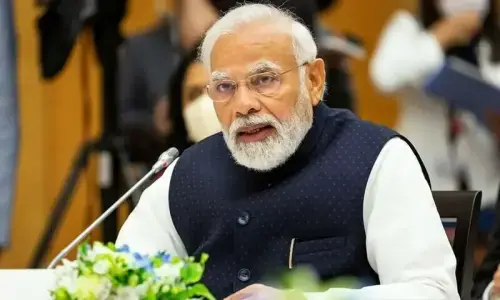In India it is routine to hear “Nice party. They served non-veg” and “Are you veg or non-veg?” We see that the expression “non-veg” does duty both as noun and as adjective. In the former role it can stand for flesh, fish or fowl – the sole essential being that whatever it may be, it is not “veg”.
In the UK, incidentally, “veg” means not vegetarian but vegetable, as in the typical meal of “steak, potatoes and two veg”.
In the late 1970s, it used to give my English girlfriend much pleasure to hear people in India call themselves vegetables: “She did look like an aubergine, you know.”
In the Hindu-CNN-IBN State of the Nation Survey of August 2006, Yogendra Yadav and Sanjay Kumar spoke of India's food habits. “The findings [of the survey] show that only 31 per cent of Indians are vegetarians,” they wrote. “The figure is 21 per cent for families (with all vegetarian members).”
This is in the present. Historians have shown that the people of ancient India, beginning with Brahmins, ate many kinds of meat, including that of cattle.
Therefore, to call India a vegetarian country when over two-thirds of Indians eat meat is imbecility. Yet vegetarianism is assumed to be the norm, encouraged or imposed by the ideologies of religion and caste.
Reprehensible deviance
The prefix “non-” is used to indicate negation or absence. Thus there are words like “non-combatant” and “nonsense”.
It may also be used to mark a negative quality or a deviation from a norm, as in “non-attractive”. In a land of Hindus, a “non-Hindu” is a deviant. In our country, because vegetarianism is wrongly assumed to be the norm, those who eat meat are called “non-vegetarians”.
The expression often has a negative connotation: the eating of meat may be seen as a reprehensible act.
Vegetarianism is known all over the world, but it is considered a harmless eccentricity.
Humans in nearly the entire world eat the flesh of mammals and birds and fishes. We are, as a species, omnivores, never mind all the ersatz Vedic humbug that flies around in Bharat.
It is only in our India that the expression “non-vegetarian” is found. Indians who go abroad get blank stares when they utter it.
No one anywhere says “non-meat-eater” or “non-carnivore”, which would be a good deal more logical.
A meat-eating family living in Ahmedabad in a housing society owned by Jains recently got 40 letters threatening the rape of their daughter as punishment for their “criminal” food habits.
Can you imagine a sattvik pujari living in Birmingham facing a death threat for his food choices: “You eat kaddu, Panditji – you die”?
This article was originally published at Scroll.in and has been reproduced here with permission.
































